The wine.plus-television program in September 2024: Our TV tips featuring all series and feature films, consumer shows, documentaries, travel reports, and reports about wine, winemakers, and viticulture.
3sat, 6:15 AM
The series "Dream Places" leads to the most beautiful locations in the world. This episode takes us to the Loire Valley, known for its fairy-tale castles and excellent wines.
SWR Television, 8:20 PM
The winery family at Hohentwiel offers not only good wines but also regional delicacies. They work with a chef who advocates for the fishermen at Lake Constance, who have been struggling as fish stocks have been declining for years.
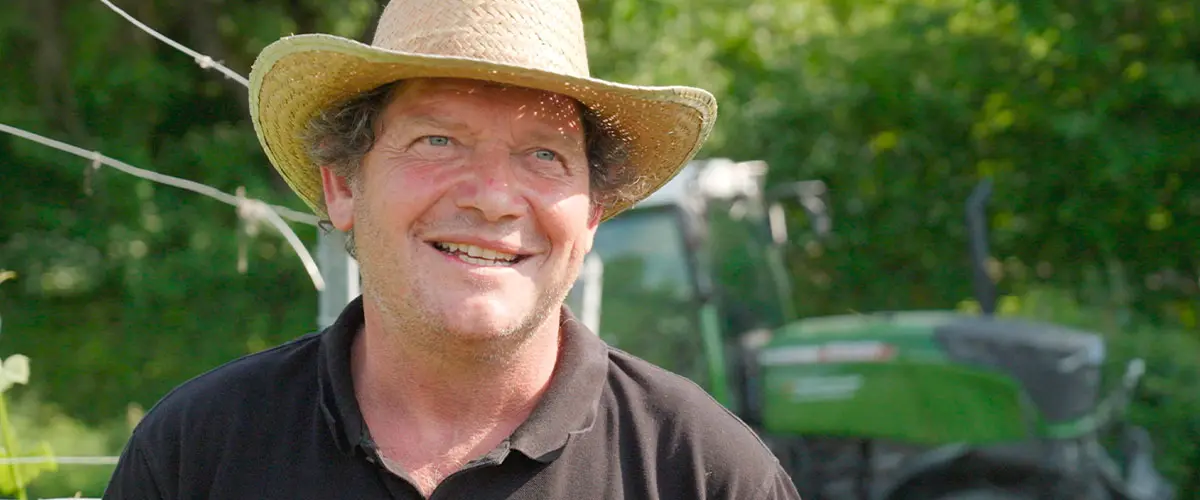 |
MDR Television, 6:10 AM
Saale-Unstrut is the northernmost wine-growing region in Europe. Where massive excavators once extracted lignite, now lies the largest lake in Saxony-Anhalt, the Geiseltalsee. And on its slopes, the Reifert brothers have planted their vines.
3sat, 3:30 PM
Spain's Mediterranean coast between Cadaqués and Torrevieja is diverse. In the north lies the Costa Brava, the "wild coast," with bizarre rock formations and secluded bays. The hinterland of the east coast also has much to offer. On the steep slopes of Priorat, wine has been thriving for centuries. Winemaker Sara Pérez ages it in amphorae.
3sat, 4:15 PM
At the southernmost tip of Europe lies one of Spain's most fascinating provinces: Andalusia. Sherry wine and Spanish raw ham make the region popular among visitors.
3sat, 5:00 PM
Around the Ebro River stretch the fertile plains of the Rioja region. This is where the famous wine of the same name comes from, which is among the most significant in Europe.
3sat, 5:45 PM
"Molinos" are the typical windmills in Spain - found everywhere in the otherwise barren landscape of La Mancha. The population mainly lives from livestock and viticulture.
SWR Television, 8:15 PM
In Dorothea John's vineyards, more than 500 different fruit, vegetable, and herb plants grow between the vines, from A for artichoke to Z for zucchini. The young winemaker aims to break the monoculture of viticulture. Both in the vineyards and in her 1,000 square meter garden, Dorothea follows the principles of permaculture and agroforestry. This is about achieving as much diversity of plants as possible, which strengthens the ecosystem and is good for soil fertility. Dorothea runs the winery in Neustadt-Königsbach with her brother and parents. In 2002, the family bought an old tithe farm and gradually transformed it into a winery. The Renaissance building dates back to 1604 and has a rare cross-vault cellar. Here, the wines age exclusively in wooden barrels.
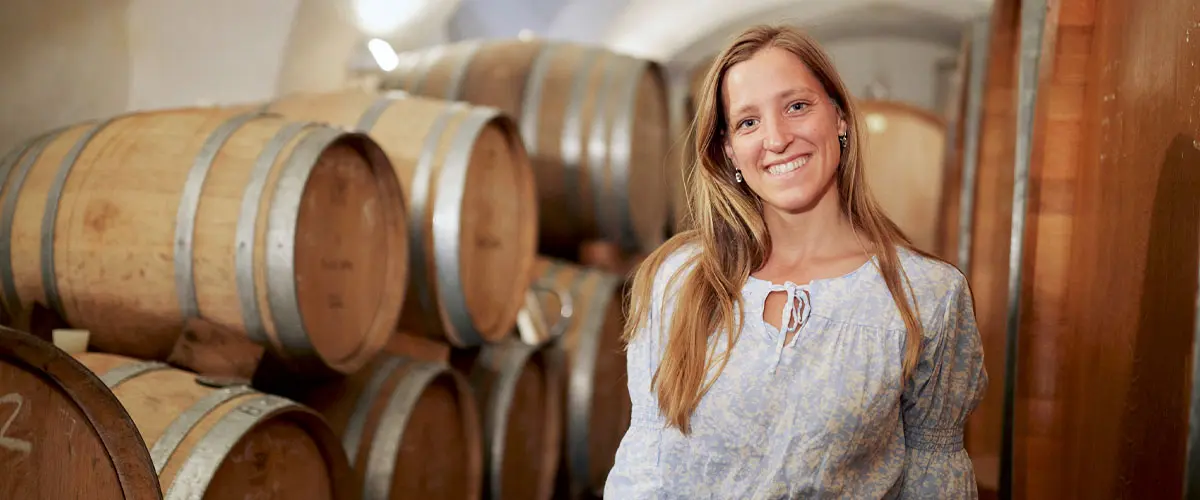 |
WDR Television, 9:00 PM
In this episode, top chefs Björn Freitag and Frank Buchholz navigate large and small harbors between Trier and Koblenz by houseboat. They are chauffeured by 27-year-old skipper Mia Licht, who grew up in the Mosel region and is proud to present her homeland to the chefs. The Art Nouveau town of Traben-Trarbach was still a stronghold of European wine trade at the turn of the 19th to the 20th century. From the "Jewel of the Middle Mosel," Björn heads to Jan-Philipp Bleeke, who founded the first wine solidarity in the Mosel in 2020 in Kröv. In the vineyard, the top chef meets some of the members who work in solidarity and learns that the young winemaker maintains a balanced ecosystem in the vineyard with the help of sheep.
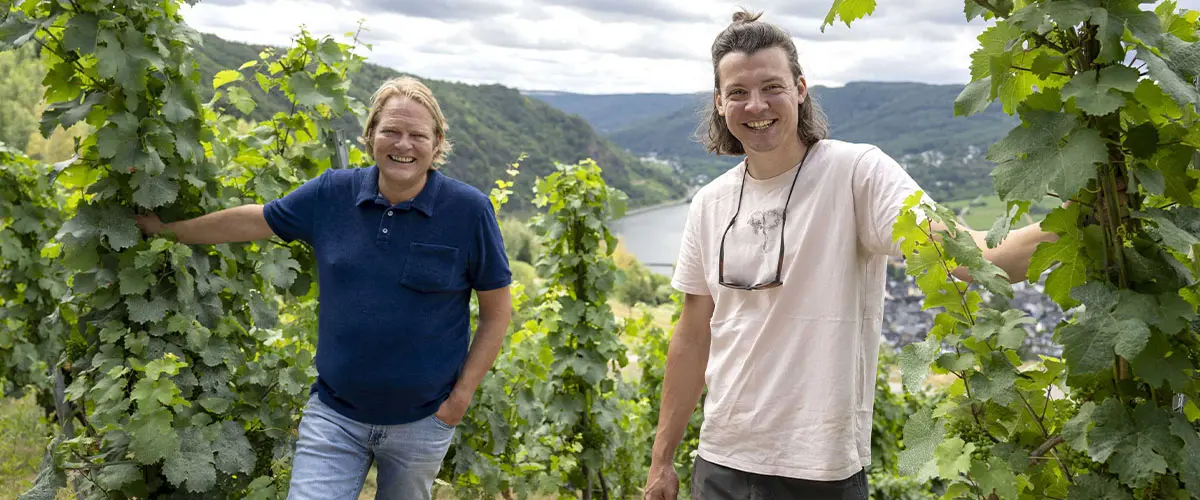 |
WDR Television, 7:20 AM
In California's Napa Valley, an organic winemaker successfully uses barn owls instead of pesticides for pest control. North of Berlin, research is being conducted on a new form of agriculture that aims to make our grain cultivation more sustainable and environmentally friendly through rows of trees in the fields. All "good news" that show: We can change things for the better.
SWR Television, 12:40 PM
The Nahe Wine Route was inaugurated in 1971. Its models were: the German Wine Route and the Baden Wine Route. They were and are projects to promote viticulture and tourism. The basic idea behind the Nahe Wine Route may no longer be current – but it is worth following its course, as the Nahe region has surprising offerings for the curious. Viticulture benefits from a mild climate and extremely diverse soils. The landscape offers spectacular panoramas. Spa towns like Bad Kreuznach and Bad Sobernheim attract those seeking relaxation to the area, where they can explore the charming landscapes of the Nahe region from the healing springs. Along the 130 kilometers of the Nahe Wine Route, viewers meet unusual people connected to this enchanting region in various ways.
3sat, 1:15 PM
The Tagliamento is one of the richest ecosystems in Europe. Untouched and wild, it winds through the Carnic Alps across the Friulian plain to the Adriatic. For centuries, the river has been the basis of life for the people along its banks. For example, winemaker Emilio Bulfon cultivates old native grape varieties on the terraces above the Tagliamento in the small village of Valeriano.
rbb Television, 2:30 PM
Anne Wader (Henriette Richter-Röhl) faces a series of misfortunes as the junior manager at the "Wader Winery": First she loses her beloved father, then there is a dispute over the inheritance, and finally, the traditional family business is on the brink of collapse. She fights alone against the selfish interests of her relatives, played by Leslie Malton and Max von Pufendorf, and the takeover by her father's arch-enemy. A glimmer of hope in this intrigue is a childhood crush, played by Sebastian Fräsdorf, who returns to his hometown after many years abroad. The German Wine Route with the Hambach Castle as a landmark offers a magnificent backdrop for the family story.
NDR Television, 12:45 PM
The summers in recent years have been intense: heat, forest fires, droughts across Europe. Climate change is here! How can we mitigate the consequences? More and more farmers see agroforestry as a solution: rows of trees in fields, under which crops and animals thrive better, the soil is protected from drying out and erosion, carbon is bound, and biodiversity arises. In France, thanks to the work of agricultural scientist Christian Dupraz, much is already known about agroforestry. On his test field, the farmer now harvests better yields than on comparison fields without trees. In Languedoc, France's largest wine-growing region, winemakers are also planting trees between the vines so that the grapes do not ripen too early in August.
3sat, 1:20 PM
The residents of the canton of Valais are said to be a unique breed: traditional, nature-loving, and cantankerous. Even in winemaking, they take their own paths. The old grape variety Heida is cultivated at over 1,000 meters above sea level. The manual work on the steep slopes is demanding, but it is enjoyable, says winemaker Isabella Kellenberger.
WDR Television, 2:35 PM
Frank Buchholz heads to the Dr. Frey Winery of the Frey-Treseler family. The newcomers, Katharina and Cord, have taken over the winery from Katharina's parents and grow their wine on steep slopes. In recent years, the Frey-Treselers have struggled with drier summer months. To protect their soil from erosion, the organic winemakers plant Mediterranean herbs like thyme under the vines. Good for Frank, as he can take fresh spices for cooking on the houseboat. Together with Frank, the winemaker tests the perfect mixing ratio of Riesling and Sauvignac for a new cuvée.
Phoenix, 3:00 PM
Istria - this part of Croatia is not only extremely popular with summer vacationers but also with food lovers. The peninsula, with its rocky coasts in the west, bustling beaches in the east, and a hinterland that could hardly be more fertile, rightly ranks among the country's top gourmet regions: finest truffles, best olive oil, and renowned wines abound - what grows here meets the highest demands.
hr television, 4:50 PM
At sunset, tapas and wine awakened Sina and Sibylle Engelke's dream of a fresh start. Out of their office jobs, into the restaurant business. Their goal was to bring the vacation flair with southern wine, delicious tapas, and a cozy atmosphere to Germany. But where to? In Fulda, the couple from Potsdam and Mainz discovered an old half-timbered house. Together, Sina and Sibylle dare a professional and personal fresh start in Fulda. In the restaurant "Stella," they try to impress with a special Mediterranean concept.
MDR Television, 2:20 PM
It is said that this is one of the most beautiful landscapes in Europe. What makes this area special? Why do so many people flock here? What makes the Mosel a dream region? In Traben-Trarbach, there are about five kilometers of underground cellars and paths where thousands of barrels were stored before being shipped all over the world. Guided tours through these old vaults are available, and in winter, there is the only underground Christmas market. Axel Bulthaupt experiences an old, now-extinct craft - that of the "Schröter." These were strongmen who hoisted the heavy barrels from the wine cellars using a very special technique. This continued until the wine pump was invented and later, the wine was sold in bottles instead of barrels. In Winningen, he helps two winemakers during the grape harvest, who aim to produce the best Riesling ever. With Norbert Klippel, he goes high into the air - from the water. He flies one of three seaplanes in Germany and lands on the Mosel. Axel learns about the wine peach, which came to the Mosel from China via Persia and the Romans.
WDR Television, 8:15 PM
The Wachau has been a popular wine-growing region since antiquity: Riesling, Grüner Veltliner, Neuburger, and Gelber Muskateller come from there. UNESCO has even declared the Wachau vineyards particularly worthy of protection. Daniel Aßmann visits Austria's oldest winery in Mautern and admires a 300-year-old tree press that is still in use today.
Bavarian Television, 6:00 AM
Schmidt Max travels to the southernmost German growing area, narrow but over 400 kilometers long: from Lake Constance to Franconia. Why is the wine from Lake Constance so special? What is the significance of the title "Burgunder-Land" claimed by the Baden winemakers? Why are Mediterranean grape varieties such as Merlot, Syrah, and Cabernet Sauvignon grown in Baden? Schmidt Max investigates these questions, all the way to the bottom of the bottle. And then there's the food! It is no coincidence that the Baden cuisine, which is heavily influenced by French cooking, is considered the best in our country.
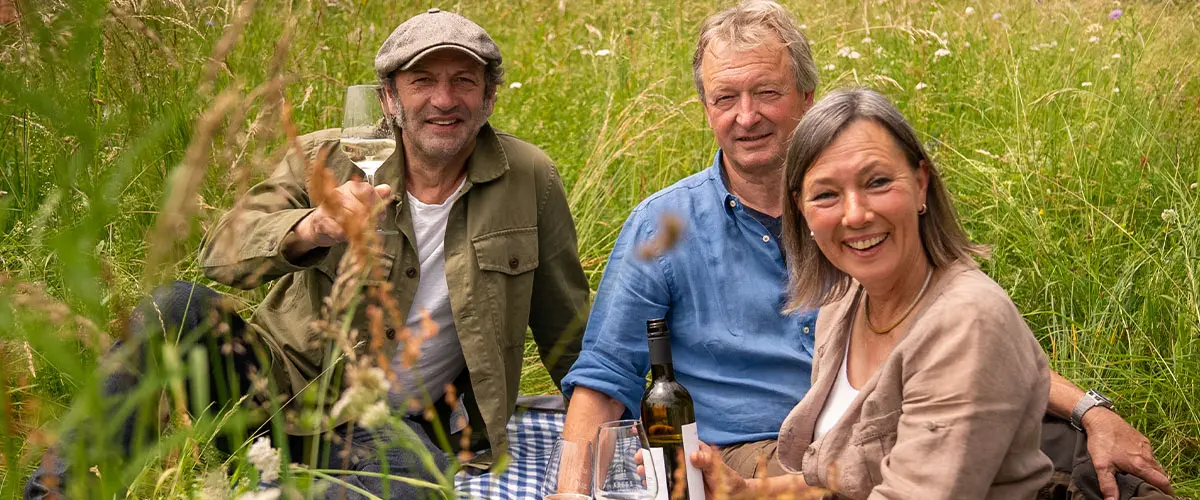 |
3sat, 12:45 PM
"Isola verde" - green island - is what the Italians call the fertile volcanic island of Ischia. In ancient times, it was the first colony from which the Greeks conquered the Italian mainland. Shortly thereafter, they founded Rome - it is said that culture came to Italy via Ischia: art, knowledge, philosophy, and wine. The report shows life on Ischia and explores the clichés associated with the island in the Gulf of Naples.
arte, 1:25 PM
In September, the grape harvest begins in Moldova, often with the whole family. The peculiarity: The grapes grow right in the cities. The diversity of soils, climates, and the fact that the northern part of the Moldovan territory lies on the same latitude as Burgundy and the south on the same latitude as Bordeaux gives its wines a similar variety as their French counterparts. However, the tradition of viticulture here is significantly older.
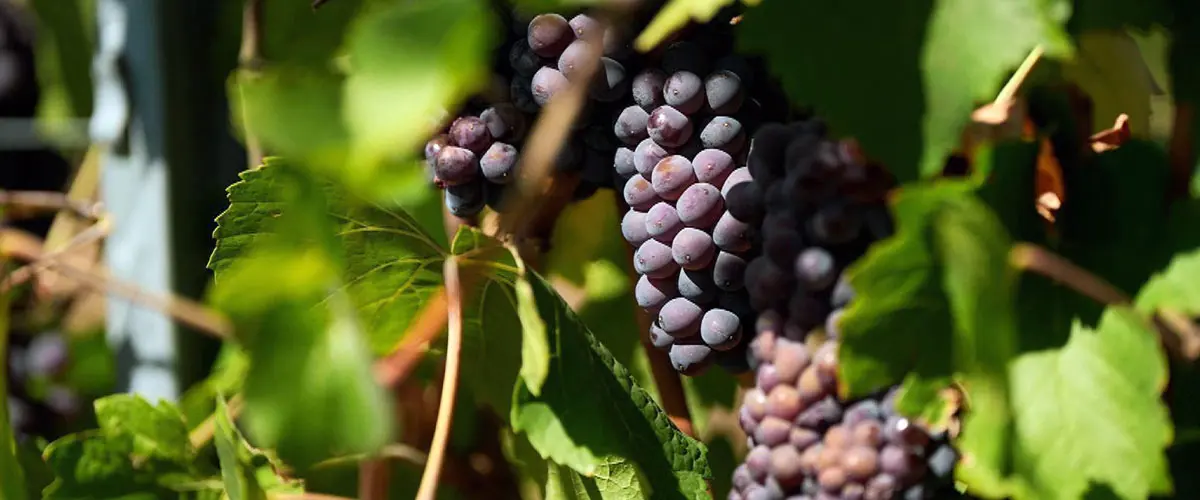 |
3sat, 2:45 PM
Twenty kilometers north of Niagara Falls, where the Niagara River flows into Lake Ontario, lies the Niagara wine region with the small historic town of Niagara-on-the-Lake. There, it seems as if time stands still. It is a region known for Canada's famous ice wine. The Inniskillin winery in Ontario has been awarded multiple times for its top wines.
WDR Television, 9:00 PM
The last stop of "Delicious on Board" is the small vinegar factory of Herbert Budweg in Ediger-Eller. Herbert is a trained chef who acquired 4,500 bottles of old Moselle wine when he bought an old winemaker's house. He uses this aged wine to create his vinegar creations. Together, Herbert and the top chef create a vintage vinegar using wine from Björn Freitag's birth year and taste various stages of vinegar fermentation. From Herbert's enchanted garden, Björn takes a special snake zucchini.
3sat, 3:10 AM
Croatia has experienced a real boom in recent years: shady seaside bays, vineyards, large forests, lakes, and culturally valuable buildings are responsible for this. Wine routes, tradition, old craftsmanship, and a rich gastronomic offer shape Croatia from Zagreb through the Plitvice Lakes to the Istrian coast.
arte, 6:35 PM
Claire Doutriaux tells the story of the Rotspon, a red wine that originally comes from France.
arte, 6:30 AM
France, the land of wine: hills full of vines shape the landscape in many regions. However, in some places, cultivation methods have exhausted the vineyards, and traditional growing areas must be cleared again and again. Some winemakers are taking new paths; they want to transform their production to combat the decline of wine culture - with new ideas, a sense of tradition, and harmony with nature. One person fighting against the decline of vineyards in France is vine breeder Lilian Bérrillon. In Villeneuve-lès-Avignon in southern France, he operates a nursery. His work is the crux of the matter regarding the survival and longevity of the plants: the quality of the vines he breeds determines the quality of the grapes that will later grow on them. "The situation is serious: In the past, vines were planted for 80 to 100 years; today, they only have a lifespan of 20 to 30 years - modern viticulture bears part of the responsibility," says Lilian. He maintains close relationships with winemakers and travels to wineries throughout the country to develop tailored solutions. The wine region of Beaujolais, located north of Lyon, is also going through a tumultuous time. The Beaujolais nouveau has led the entire region into crisis. Here, Julien Merle, a young winemaker in his fifth generation, has completely broken with previous cultivation practices. Together with his partner Nathalie, he works in a peasant tradition: ecologically, without chemicals. The result is young natural wines that are not only trending in France but worldwide. Will the "young wild ones" succeed in the wine market? The program is also available online from August 23 to September 29, 2024, on arte.tv
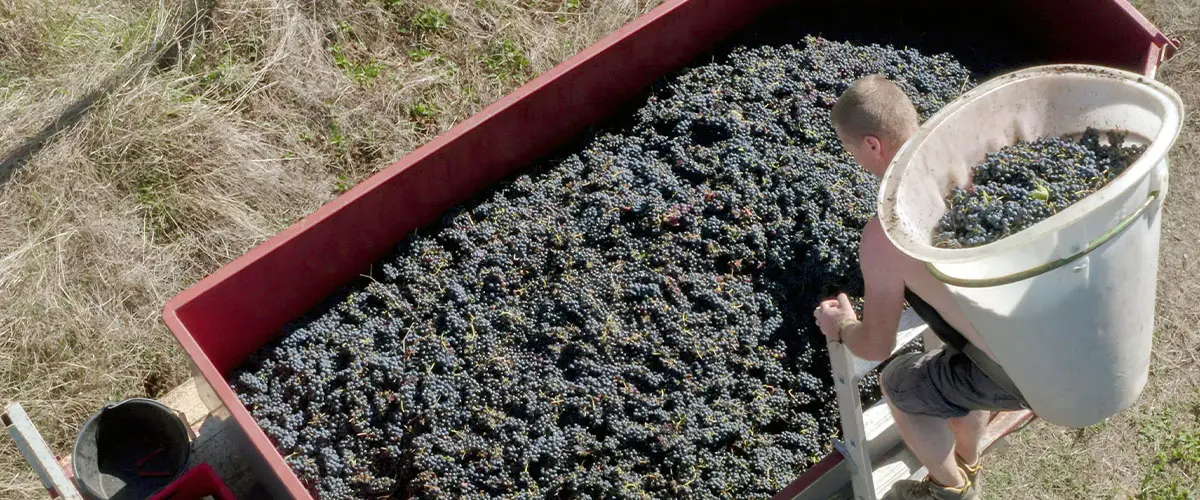 |
rbb television, 4:30 PM
Henriette Richter-Röhl alias Anne Wader makes a fresh start as a manager at the neighboring Roscher Winery. However, she cannot simply leave the "Wader Winery" behind: When the Palatinate organic winemaker learns of difficulties in the family business, she rushes to help immediately. The serious suspicion that the traditional winery is being deliberately driven to ruin falls on her successor and even on relatives. Additionally, the decades-long conflict between the two Wader patriarchs weighs heavily on the family clan like a curse. When Anne uncovers a secret of her deceased father, her uncle Bruno's family breaks apart. The boundless anger of her cousin, played by Kyra Sophia Kahre, also has serious consequences for Anne. In the second film of the family saga, the new life that the organic winemaker is just building threatens to collapse again.
3sat, 4:00 PM
When the excavators removed the earth from the village of Geisendorf, they stumbled upon ancient wine terraces. After the excavators left, a mountain of mineral-rich rock was heaped up - the Wolkenberg. Bettina Muthmann and Martin Schwarz have begun to grow wine there again. In a still barren landscape, the duo manages to fill wine barrels with grape juice from Brandenburg every year.
3sat, 1:15 PM
Southern Alsace impresses with the diversity of its landscape - from the vineyards along the Alsatian Wine Route to the peaks of the Vosges and the bustling city of Mulhouse. On the Alsatian Wine Route, a winemaker couple has focused on sustainable architecture while building their farm and has switched to biodynamic cultivation.
3sat, 2:00 PM
Alsace is primarily characterized by its rural nature. It is apparent that people know each other. In the villages, the dialect is often still alive, as in Seebach, one of the most beautiful half-timbered towns in Northern Alsace. There, the film crew visits a Franco-German winemaker couple producing organic wine and Crémant. It is said that Alsatian Crémant rosé is on the rise.
3sat, 5:45 PM
Tuscany can also be tasted. This applies to Chianti with its famous wines and to Maremma with its good cheese. Tuscan cuisine relies heavily on good ingredients and thus on the wealth of small farms that one must visit during a trip through Tuscany.
rbb television, 4:30 PM
For the Palatinate winemaker Anne (Henriette Richter-Röhl), things get tough from the very beginning as the new manager of the Wader Winery. At first, she struggles to save her vines during a frost, then the supervisory authority shuts down her operation due to allegations of fraud. Only when it is clarified whether 3,000 liters of wine were sold under the table and who has oversulfited the red wine in the tanks can production and sales continue. This takes time – and by then, the Waders are probably bankrupt! Only if Anne's mother Käthe (Leslie Malton) takes responsibility for the serious mistakes made under her leadership is there a way out of the threatening situation. However, it is difficult for the matriarch, who wanted to prove herself after the death of her highly respected husband, to sacrifice her reputation as a winemaker.
arte, 5:50 PM
The largest department in France is characterized by noble wines and oyster farming as well as a diverse nature with great biodiversity. The name Gironde refers to both the region and its namesake: a mighty river that shapes the entire area. The Gironde is the last untamed tidal stream in Europe. The confluence of the Garonne and Dordogne rivers is more than ten kilometers wide at its mouth into the Atlantic. The Gironde largely determines the climate of the region. The water surface of the river evaporates so much liquid that it is never too hot and never too cold here. The sediments that have accumulated along the banks over millennia make the soils some of the most valuable wine-growing areas in the world. However, this region also faces industry and the urge of cities like Bordeaux to expand. How can the balance between man and nature be achieved? And how can the wonderful world of Gironde be preserved? The program is also available online from September 20 to December 19, 2024, on arte.tv
arte, 7:45 AM
France, the land of wine: hills full of vines shape the landscape in many regions. However, in some places, cultivation methods have exhausted the vineyards, and traditional growing areas must be cleared again and again. Some winemakers are taking new paths; they want to transform their production to combat the decline of wine culture - with new ideas, a sense of tradition, and harmony with nature. One person fighting against the decline of vineyards in France is vine breeder Lilian Bérrillon. In Villeneuve-lès-Avignon in southern France, he operates a nursery. His work is the crux of the matter regarding the survival and longevity of the plants: the quality of the vines he breeds determines the quality of the grapes that will later grow on them. "The situation is serious: In the past, vines were planted for 80 to 100 years; today, they only have a lifespan of 20 to 30 years - modern viticulture bears part of the responsibility," says Lilian. He maintains close relationships with winemakers and travels to wineries throughout the country to develop tailored solutions. The wine region of Beaujolais, located north of Lyon, is also going through a tumultuous time. The Beaujolais nouveau has led the entire region into crisis. Here, Julien Merle, a young winemaker in his fifth generation, has completely broken with previous cultivation practices. Together with his partner Nathalie, he works in a peasant tradition: ecologically, without chemicals. The result is young natural wines that are not only trending in France but worldwide. Will the "young wild ones" succeed in the wine market? The program is also available online from August 23 to September 29, 2024, on arte.tv
3sat, 2:00 PM
Thanks to the pleasant climate, a lush vegetation with oleander, palms, cypress, vineyards, and olive trees thrives in Trentino. The Garda Trentino is the world's northernmost olive-growing region - reason enough to visit a local olive farmer.
3sat, 3:30 PM
The journey goes eastward with the "Linha do Douro." Originally, the railway line was built to transport wine from the Douro Valley to the port wine cellars. Today, the route is famous for its breathtaking views of the river. And on the slopes of the Douro, which winds from the mountains to the sea, grapes for the famous port wines ripen, along with small jewels. With his winery "Quinta do Cume," Jorge Tenreiro has fulfilled a dream. The heart surgeon grew up on a vineyard. When he was 18, his father sold the estate. But childhood memories did not let Jorge go. That is why he and his wife Claudia invested in a few hectares of land in the heart of the green Douro Valley. Every September, the whole family comes for the grape harvest.
arte, 6:40 PM
The four-part documentary series "Delicious South Tyrol" bridges the south and north, introduces the alpine-Mediterranean cuisine, and encourages viewers to cook along. In each episode, people from the region invite viewers for a personal insight into their lives and their local pantry. The fourth episode focuses on delicacies such as Graukäse and Altreier lupins from the region around Bolzano. Julia and Karoline Walch are winemakers in the fifth generation. Their mother Elena revolutionized South Tyrolean viticulture, raising it to international standards. But what happens to the elegant South Tyrolean wine in times of climate change? The sisters discuss this while cooking. Their wild game roast is, of course, simmered in wine, served with polenta, pears, and cranberries. The program is also available online from September 21 to December 21, 2024, on arte.tv
3sat, 7:30 PM
For Philippe Schuler, a career in the family wine trade has always been out of the question. However, his father does not want to be the one to sell the 330-year-old family heritage at any cost. Now father and son face the question: Is family really always the best choice to secure the continuity of a business?
3sat, 5:00 PM
Attractions such as the Plaza de España in Seville and the fortress Alhambra in Granada, as well as delicacies like sherry wine and Spanish raw ham, make the region so popular among visitors.
3sat, 10:25 AM
Anne Willmes tries the delicious pintxos, the Basque tapas, admires the archaic nature in the Zumaia Geopark, and pilgrimages along the Camino de Santiago between coast and vineyards.
arte, 7:25 AM
In Panormos, Mary cooks a traditional Cretan dish in which she marinates a rabbit in wine and vinegar. She then sweats an onion, adds a dried lemon and orange peel as seasoning, and browns the rabbit pieces in it. Finally, she mixes in vine leaves, a few raisins, almonds, and some lemon juice.
rbb television, 4:30 PM
It is one against all for Henriette Richter-Röhl as the Palatinate organic winemaker Anne in "New Paths," the fourth film of the family saga "Wader Winery." With the consistent rejection of toxic pesticides, she turns her equally traditional yet stubborn neighbors against her and sparks a small war. That her uncle Bruno, played by Jürgen Heinrich, is secretly pouring oil on the fire, the idealistic winemaker initially does not notice. Meanwhile, Leslie Malton makes a private fresh start as a newly in love matriarch who has largely concluded her involvement with the winery's affairs.
3sat, 10:00 AM
In the southwest of Styria lies a region that is often overlooked. Both Soboth and Weinebene are pass landscapes. How do people live in this area, and what do they live on? The film team visits the village of Soboth, which rests idyllically in itself. Through the protagonists, the documentary paints an authentic picture of a hidden land that the people cultivate with great love for their homeland.